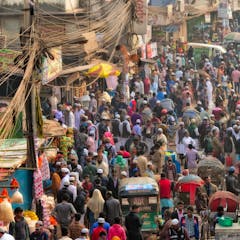
Articles on Urbanisation
Displaying 1 - 20 of 132 articles

Rural Tanzanians and those living in the city eat unhealthy diets, but their circumstances are very different.

Urbanisation in India is causing Adivasi communities to lose connections to ancestral lands – and to traditional knowledge and belief systems. Urban Hinduisation plays a big role in this.

Dust and traffic pollution add to the health hazard posed by some cooking fuels.

Slums in Bamako, Mali are transforming into landscapes of protracted unrest, civil conflict, violent extremism and urban insurgency.

The inability of city authorities to enforce land-use regulations has allowed people to carry out ecologically unfriendly activities along the water bodies.

Due to limited interactions with the police, Kenyans in rural areas are less likely to see the police as relevant actors.

From lit-up orbs to bland office blocks, cities are full of buildings that people do or do not like. What really shapes how they live – for better or for worse – is urban planning.

Puddles are an often-ignored but crucial habitat for rare and unusual wildlife.

The impact of housing quality extends beyond health to education and subsequent economic outcomes, particularly for children.

If the numbers are correct, and it’s not certain that they are, Cape Town may have overtaken Johannesburg as the largest city in South Africa.

The city of Accra has no plan to tackle pedestrians’ behaviour.

What makes a city workable to many people is access to informal labour markets, cheap travel options, flexible housing and rental arrangements.

Ghana’s implementation of key population policies has not been consistent.

A world without pastoralists would not only be a poorer place, but we would lose an important lifeline to our collective future.

Kenya’s experienced fast population growth and urbanisation - this has brought about some big challenges.

Many countries in West Africa do not have up to date census surveys.

Air pollution accounts for many deaths in Africa yearly. However, this may change if people learn to protect themselves and hold their leaders accountable.

Experiencing nature helps people in times of joy and pain. However, inequity of access to green spaces means that South Africans cannot enjoy nature when they need to.

Autumn extreme fire weather around Cape Town in South Africa has become 90% more likely in a warmer world.

If the Earth were ever subsumed into a single cityscape, it would collapse under the weight of its own ecological footprint.





